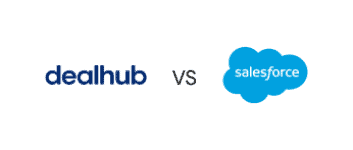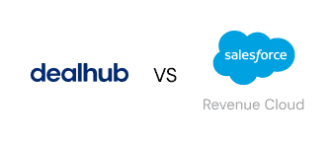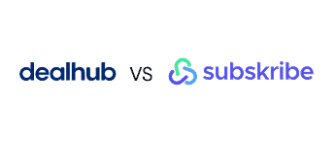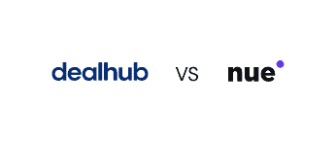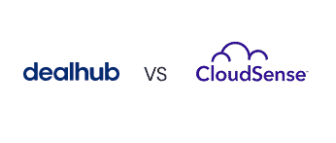Introduction
Compare DealHub CPQ and Salesforce CPQ
DealHub and Salesforce are established names in CPQ solutions that automate the sales process. Both products feature many core capabilities, including guided selling, product configuration, dynamic pricing, CRM integration, API integrations, subscription and contract management, and numerous out-of-the-box functionalities. However, significant differences between the two solutions make them better suited for different use cases and business stages.
DealHub CPQ anchors a comprehensive Quote-to-Revenue platform that unifies CPQ, contract lifecycle management (CLM), eSignature, subscription billing, usage metering, and automated revenue recognition in a single system. The platform handles any pricing model (e.g., subscriptions, usage-based, hybrid structures, prepaid credits) without custom code, while AI-powered capabilities enable sales teams to create complex quotes in seconds. DealHub’s intuitive, no-code interface and rapid implementation make it ideal for fast-growing SaaS companies and enterprises seeking to modernize fragmented revenue stacks, eliminate reconciliation overhead, and support multiple go-to-market motions and monetization models.
Salesforce CPQ, now exclusively available as part of Salesforce Revenue Cloud rather than as a standalone product, offers deep integration with Salesforce CRM and robust customization options for organizations already heavily invested in the Salesforce ecosystem. While its ability to configure advanced pricing models and complex product catalogs serves businesses across industries, the platform is known for lengthy implementation timelines, substantial customization requirements, and a higher total cost of ownership than alternative solutions.
Product Overview
Overview of each CPQ Solution
DealHub CPQ and Salesforce CPQ are both widely used by organizations in various industries. Here’s a quick overview of each product and what it does well.
Define DealHub CPQ
DealHub CPQ is the foundation of DealHub’s complete Quote-to-Revenue platform, seamlessly connecting CPQ, CLM, eSignature, Subscription Management, and Billing to help businesses optimize revenue and scale efficiently. With the launch of DealHub 2.0, the platform introduces a significant upgrade, reimagining the quoting experience to be more intuitive, composable, and scalable. Revenue teams can now configure workflows with greater flexibility, adapt processes in real time, and collaborate more effectively across departments.
DealHub’s robust CPQ solution features a user-friendly, no-code interface for quickly managing product catalogs, pricing rules, and quotes. Its guided selling process lives within the CRM workflow, empowering sales teams with a streamlined, dynamic quoting experience that outpaces legacy systems in speed, agility, and ease of maintenance. Tools like DealRoom (a digital sales room), Deal Talk, and Deal Stream, further enhance buyer engagement, positioning DealHub as a modern, end-to-end revenue platform built for collaboration and growth.
Define Salesforce CPQ
Salesforce is the CRM industry gold standard for sales automation and customer data management. Its CPQ solution is part of Salesforce Revenue Cloud. CPQ provides a solution for configuring complex products and bundles using the same interface as Salesforce CRM.
This cloud-based solution integrates seamlessly with Salesforce’s CRM platform to provide real-time insights into customers, deals, and prospects, making it a good choice for existing or prospective Salesforce customers.
Product Features
Comparison of Key Features
DealHub CPQ and Salesforce CPQ both offer robust features designed to streamline quoting and complex sales, but they take fundamentally different approaches to scope, architecture, automation, and ease of use.
DealHub CPQ delivers a unified Quote-to-Revenue platform that extends beyond traditional CPQ to encompass subscription billing, real-time usage metering, and automated revenue recognition, eliminating the fragmented, multi-vendor stacks that create reconciliation overhead and data inconsistencies.
The platform is known for its no-code configuration and AI-powered automation, enabling businesses to implement and adapt without extensive IT involvement or reliance on consultants. Sales teams can quickly create complex quotes, including multi-year ramps, usage tiers, mid-term amendments, and hybrid pricing models, while automated approval workflows with real-time tracking and Slack notifications prevent deals from stalling in approval limbo.
DealHub natively supports any pricing model without workarounds: subscriptions, usage-based, consumption metering, prepaid credits, tiered pricing, volume discounts, and hybrid structures that combine multiple approaches. The platform’s real-time metering infrastructure ingests consumption events at scale across any dimension (API calls, compute time, tokens, custom metrics), enabling accurate invoicing and transparent customer experiences for product-led growth and consumption-based business models.
Built-in ASC 606 and IFRS 15 compliance engines automate revenue recognition across complex scenarios like co-terming, prorated upgrades, and multi-element arrangements, while maintaining complete audit trails that satisfy SOX requirements.
Advanced filtering capabilities help users quickly surface critical deals (i.e., upcoming renewals, proposals needing attention, high-value opportunities) using customizable, shareable filters with visual cues for easy recognition. Real-time dashboards provide live visibility into ARR, MRR, churn, expansion revenue, and pipeline health without waiting for month-end reports.
Native integrations with CRMs like Salesforce, Microsoft Dynamics, and HubSpot, plus connections to NetSuite, QuickBooks, Stripe, and DocuSign, create a unified revenue experience without custom development. The API-first architecture enables embedded quoting experiences, self-service portals, and custom integrations while maintaining backend governance.
Salesforce CPQ, now exclusively bundled within Salesforce Revenue Cloud rather than available as a standalone product, offers deep customization and flexibility for businesses already heavily invested in the Salesforce ecosystem. It supports complex product configurations and pricing models but typically requires extensive setup (often 6-18 months for full implementation), ongoing maintenance, and dedicated administrators or consultants to manage customizations and system updates. While it offers powerful functionality, including advanced approval processes, its complex configuration often requires technical resources for changes that business users can handle on no-code platforms like DealHub.
Salesforce CPQ’s integration with Salesforce CRM is seamless, but organizations report challenges when connecting it with billing systems, usage metering infrastructure, or external platforms. It often requires costly middleware, custom integrations, or point-to-point connections, which create technical debt.
The platform was designed for traditional enterprise sales cycles rather than modern revenue models like product-led growth, self-service, or real-time consumption billing, meaning organizations pursuing these motions often build workarounds or supplement with additional vendors, increasing total cost of ownership and operational complexity.
Below is a breakdown of the key features that each product provides.
| Feature | DealHub CPQ | Salesforce CPQ |
|---|---|---|
| Implementation Timeline | Weeks (typically 4-12 weeks) | Months (typically 6-18 months) |
| Quote Creation Speed | 30 seconds for complex quotes with AI | Minutes to hours, manual configuration |
| Pricing Model Support | Native support for subscriptions, usage-based, hybrid, credits, one-time (no custom code) | Requires customization for usage-based and hybrid models |
| Real-Time Usage Metering | Built-in consumption tracking at scale (millions of events daily) | Requires third-party integration or custom development |
| Subscription Billing | Unified platform with automated billing, proration, amendments | Requires separate Salesforce Billing (Revenue Cloud bundle) |
| Automated Revenue Recognition | Built-in ASC 606/IFRS 15 engines with audit trails | Requires Revenue Cloud bundle, complex configuration |
| Mid-Term Amendment Handling | Automatic proration, co-terming, upgrade/downgrade calculations | Manual configuration required, complex to maintain |
| Real-Time ARR/MRR Tracking | Live dashboards with instant metrics | Batch processing, delayed reporting |
| AI-Powered Quoting | DealDesk AI creates quotes from requirements in seconds | Limited AI capabilities, manual quote building |
| Configuration Approach | No-code, business user-friendly interface | Code/developer-heavy, requires technical resources |
| Data Model | Unified from quote to revenue recognition (zero reconciliation) | Fragmented across CPQ, Billing, separate systems |
| Approval Workflow Setup | Configure in seconds with visual interface | Complex setup requiring technical configuration |
| Interactive Sales Rooms | DealRoom built-in branded buyer collaboration portals | Requires third-party integration (e.g., Conga Composer) |
| Self-Service Customer Portal | Native self-service for upgrades, add-ons, usage visibility | Requires custom development or third-party tools |
| CRM Integration | Native: Salesforce, HubSpot, Microsoft Dynamics | Native: Salesforce only; others require custom work |
| API Architecture | API-first: REST and GraphQL for all functions | Limited API access, many functions UI-only |
| Total Cost of Ownership | Lower than legacy CPQ systems | High: licenses, implementation, consultants, ongoing maintenance |
| User Training Required | Minimal (virtually none for basic use) | Extensive training and ongoing support needed |
| Multi-Currency Support | Native multi-currency and multi-entity billing | Available but requires configuration |
| Compliance & Security | SOC 2 Type II, GDPR, built-in ASC 606/IFRS 15 automation | SOC 2 certified, requires Revenue Cloud for ASC 606 automation |
| Platform Accessibility | Web-based platform. | Web and mobile (iPhone and Android) platforms. |
| Customer Support | Implementation teamPhone supportMobile and online customer supportKnowledge baseDealHub Academy | Phone supportKnowledge baseChatFAQs/ForumLive online supportIn-person training Documentation |
Customer Size
Ideal Customer Profiles
DealHub CPQ is built to scale with organizations of different sizes — from fast-growing companies to large enterprises. Its architecture combines enterprise-grade capabilities with an approachable, no-code configuration that makes it easier to implement, adopt, and maintain compared to traditional CPQ platforms. That combination helps RevOps teams support complex pricing models, subscription management, and contract workflows without the need for heavy IT support.
Because it is simpler to roll out, DealHub is often chosen by companies that want faster time-to-value or don’t have the appetite for long, resource-intensive implementations — but it also serves global enterprises that need to unify CPQ, CLM, and billing in a single platform.
Salesforce CPQ delivers a deep set of features and is a strong option for organizations already standardized on Salesforce CRM. However, it generally requires more time, budget, and dedicated technical resources to implement and manage, which can be a hurdle for companies looking for quicker adoption and agility.
Pricing
Breakdown of Pricing Options
Both Salesforce CPQ and DealHub CPQ use usage-based pricing models, meaning that the pricing plan is tailored to each customer’s specific needs.
The cost of Salesforce CPQ varies, but typically it runs between $75 and $150 per user, per month. It also requires additional fees for customizations, implementations, and other services.
Implementation costs for a customized system within Salesforce can take a significant amount of time and cost businesses a considerable amount of money.
| DealHub CPQ | Salesforce CPQ | |
|---|---|---|
| Product Pricing | Contact sales | CPQ: $75 per user per month (billed annually) CPQ Plus: $150 per user per month, billed annually CPQ + Billing Growth: Contact sales CPQ + Billing Plus: Contact sales |
| Implementation Fees | One-time implementation fee | Ongoing implementation fees for custom coding |
| Additional Licenses | No additional license fees | Additional license fees for e-sign, contract management, buyer engagement tracking |
To use Salesforce CPQ to its fullest extent, you’ll need to pay an implementation fee and possibly additional customization costs for complex use cases (i.e., custom coding). And applications related to Salesforce CPQ—like contract management, e-signature, sales proposals, and buyer engagement tracking—sometimes come with hidden license fees.
With DealHub, you’ll only have to pay a minimal one-time setup cost. You can then enjoy the advantages of having an integrated and complete sales stack for a fixed fee. And the pricing is dependent on usage, so you won’t pay more than you need to.
Pricing for DealHub CPQ is based on the organization, and prospective buyers need to talk to sales representatives about their needs. The plan is tailored to each client and starts at around $50 per user per month.
Summary
Considerations for Choosing Between the Two Solutions
When choosing between DealHub CPQ and Salesforce CPQ, businesses should consider factors such as implementation complexity, ease of use, scalability, and integration needs.
DealHub CPQ is ideal for companies seeking a user-friendly CPQ solution that streamlines quoting, contract management, and subscription billing without requiring extensive IT resources. Its guided selling and automation capabilities help sales teams close deals faster with minimal administrative effort. In its latest platform upgrade, DealHub delivers a more intuitive experience tailored to modern sales teams. With a no-code UI, advanced workflow capabilities, and real-time collaboration, DealHub raises the bar for CPQ usability and adaptability, areas where Salesforce CPQ has traditionally lagged due to its complexity and dependence on technical customization.
Salesforce CPQ was a powerful choice for organizations deeply embedded in the Salesforce ecosystem and requiring advanced customization and scalability. However, it is being phased out and is no longer available to purchase as a stand-alone managed service. Its implementation and maintenance often require dedicated administrators or developers. Businesses prioritizing speed, simplicity, and seamless CRM integration may find DealHub CPQ more suitable, while those highly embedded in the Salesforce ecosystem may benefit from Salesforce Revenue Cloud now that CPQ is not being sold.
FAQs
Frequently Asked Questions
DealHub CPQ integrates seamlessly with Salesforce CRM, so Salesforce customers can access the right customer data, contact information, existing products, and other details without having to manually enter them.
Additionally, DealHub CPQ enables sales teams to quickly generate quotes and contracts that are accurate and compliant with company policies, which may already be predetermined in Salesforce.
In certain cases, a 100% native solution may not be recommended or feasible. Salesforce even suggests a hybrid solution to drive large-scale calculations requiring immense computing power and abundant storage space for your CPQ solutions. It’s best to select a system that can efficiently execute the task at hand.
When an organization deploys a solid composite system, it will not only enable users to have an incomparable experience with Salesforce but also give them the benefit of cost-savings and improvements in performance.
For example, DealHub CPQ’s digital sales room technology makes it easy to centralize stakeholder and prospect communication—an important factor in today’s digital-first environment. And with predictive sales playbooks and guided selling, DealHub might improve a company’s workflows better than Salesforce’s native option.
Since it readily integrates with CRM systems including Salesforce, DealHub is still a viable option even over a 100% native solution.
Salesforce purchased SteelBrick CPQ in December 2015 and rebranded it as Salesforce CPQ. SteelBrick was a cloud-based product configuration and quoting solution that enables users to quickly configure, price, quote and order products.
Salesforce CPQ is based on the same platform as SteelBrick. But since the initial purchase, the company has rolled out additional features such as integrated contract management, robust pricing rules, automated workflow approvals, and more.
Salesforce CPQ competes with a variety of CPQ solutions, including DealHub CPQ. Its direct competitors include CRM providers like HubSpot, Freshworks CRM, and Microsoft Dynamics, which have their own CPQ offerings as add-ons or standalone products. CPQ vendors such as Conga and FPX also compete with Salesforce CPQ.
DealHub is a modern deal management software that competes with Salesforce CPQ, as well as other CPQ solutions such as Conga, PROS, and Experlogix. DealHub also competes with contract management software providers such as DocuSign and PandaDoc, although its primary focus is on CPQ solutions.
DealHub CPQ prioritizes speed, automation, and unified revenue operations with fast implementation and lower total cost of ownership. The platform handles the complete revenue lifecycle, from quote through billing, usage tracking, and revenue recognition, on a single governed data model, eliminating reconciliation between systems and ensuring that what sales quotes is precisely what finance bills and recognizes. This architecture particularly benefits fast-growing SaaS companies, enterprises with usage-based or hybrid pricing models, and organizations seeking to consolidate fragmented revenue tech stacks.
Additionally, DealHub has a DealRoom feature that allows teams to collaborate on the same page with customers or prospects in real-time. This feature makes it easy for sales reps to provide product demos, resolve customer inquiries, and track stakeholder engagement during the sales process.
Salesforce CPQ offers extensive customization and deep CRM integration within the Salesforce ecosystem, but with significantly higher implementation costs, longer timelines, and ongoing maintenance requirements. It remains a viable option for large enterprises already standardized on Salesforce with dedicated technical teams, though even Salesforce-native organizations increasingly evaluate modern alternatives to reduce complexity and accelerate revenue operations.
Businesses seeking rapid implementation, intuitive operations, unified quote-to-revenue capabilities, and modern pricing model support will find that DealHub delivers immediate value with minimal overhead. Organizations requiring deep Salesforce ecosystem integration and willing to invest in lengthy implementations with a higher total cost of ownership may consider Salesforce Revenue Cloud.
The most important features of CPQ software are:
Product configuration
Pricing rules
Guided selling
Automated quote generation
Contract management (CLM)
Integration with CRM systems such as Salesforce
Workflow automation
Robust analytics and reporting
These features allow users to streamline the sales process, automate processes, manage contracts effectively, and gain better insights into the business.

Andrew is a professional copywriter with expertise in creating content focused on business-to-business (B2B) software. He conducts research and produces articles that provide valuable insights and information to his readers.

